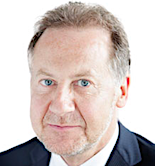Abrdn’s £1.6 billion Murray International Trust announced that its controversial lead investment manager Bruce Stout will retire in from the Edinburgh investment giant in 2024.
Stout, meanwhile, was in typical form as a critic of central banks as Murray International Trust reported half-yearly results to June 30, 2023, showing its net asset value (NAV) posted a total return of +2.2%.
Stout’s co-managers Martin Connaghan and Samantha Fitzpatrick, who have worked with him since 2001, will continue managing the fund. Virginia Holmes will assume role of chair from December 31, 2023, following David Hardie’s retirement.
Stout, Connaghan and Fitzpatrick wrote: “Continuation of the sharpest reactionary monetary tightening witnessed in living memory featured prominently throughout the first six months of 2023.
“As interest rates were relentlessly raised and the cost of borrowing soared, most of the debt-dependent Developed World teetered on the brink of recession.
“Yet any objective assessment of what has actually been achieved by such draconian policy action remains arguably subjective to say the least.
“Identifiable inflationary pressures associated with commodity price inflation have ‘behaved’ pretty much in textbook fashion.
“With oil and gas prices down over 50% from twelve months ago, most hard commodity prices have succumbed to the free-market equilibrium associated with lower demand and expanding supply. Yet inflation in many countries persists.
“For those familiar with the economic vandalism inherent in Central Banks printing money and the consequences of such irresponsible pandering to financial markets, this will come as no surprise. After all, inflation is an ‘always and everywhere’ monetary phenomenon.
“Until such time that bond markets can accurately price the reality of debt servicing obligations, deteriorating creditworthiness of sovereign states, future interest rate volatility and political incompetence, then inflationary pressures are likely to persist.
“Against this backdrop, increasingly ineffectual policymakers are coming under intense political pressure to ‘do more’ despite the reality of being ‘unable to do much’, thereby prolonging the economic uncertainty and negative consequences that unconstrained inflation has on currencies, wealth and prosperity.
“For individual savers, the reality of negative real returns has increasingly become the all-consuming focus of investment strategies.”
In their outlook, the fund managers wrote: “Cracking a nut with a sledgehammer seldom delivers the desired results. The shell usually breaks but the kernel invariably gets pulverised in the process.
“Faced with stubbornly high inflation in the Developed World, discredited and detached Central Banks continue to follow a similar Pavlovian practice which, in their world, involves hiking interest rates until demand subsides.
“This is theoretically logical if it is assumed that excessive consumer demand is the root of all price inflation.
“However, it is woefully misguided if rigidity of labour markets, deglobalisation, rising global protectionism or ‘doing whatever it takes’ through printing money are structurally influencing the overall cost of living.
“Against such a backdrop, religiously following such a one-dimensional dogma appears at best foolhardy, at worst downright destructive.
“In the meantime, the lagged effects of the monetary tightening implemented so far are beginning to emerge. For the G7 nations, drowning in a deluge of self-inflicted debt dynamics, servicing existing borrowings at higher interest rates has become the daily priority.
“The tougher and more politically unpopular conditions become for the indebted world, the greater the pressure to ‘bend’ will mount on policymakers accustomed and conditioned to ‘choosing’ the popular way out.
“However, the days of bailing out all and sundry through the public purse and supporting the ill-disciplined and indebted at the expense of the responsible saver are over.
“The re-emergence of inflation, tighter liquidity and acute competition for available funds has seen to that. For the Developed World’s Monetary Authorities, what they might want to do versus what they can actually do this time around appears profoundly different.”
